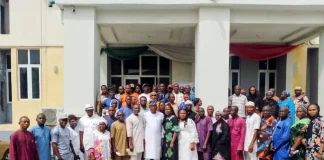While there are hazards involved, capital market operators have been advised to take use of technology’s potential to improve their operations.
During his keynote speech at the Institute of Capital Market Registrars’ 12th annual conference over the weekend, Ade Bajomo, the President of FinTech Nigeria, made this claim.
“Navigating Nigeria’s Economic Realities: The Transformative Power of Technology in the Capital Market” was the subject of the conference.
Bajomo said, “Technology has the potential to be a powerful equaliser and if our industry is to play a part in the fifth industrial era, then we must have capital market operators use the technology. It has been proven time and time again that those who exploit technology in a certain manner will keep competitive advantage.”
“We must also be mindful of the potential risks in the use of the technology in our capital market. We must ensure we have appropriate regulatory framework in place to protect investors and maintain market integrity. In conclusion, the power of technology in transforming the capital market is undeniable. However, we must use this power responsibly and with caution.”
Speaking on the topic ‘Empowering market participants through education and capacity building,’ the Executive Commissioner, Operations, Securities and Exchange Commission, Dayo Obisan, advised registrars to first of all identify the participants in the sector, which has changed due to technology, in order to educate them.
He said, “The market has changed. There has been a lot of dynamics. A lot of people use the word, fintechs loosely but a lot is happening in that space and that was one of the reasons we had to quickly revise the capital market master plan. Back then, there were no fintechs, there were no digital brokers, there were no robot advisors, but we now have those and we had to quickly register.
Speaking as well, Haruna Jalo-Waziri, CEO of Central Securities Clearing System Plc, predicted that the capital market will see novel products emerge as a result of technology adoption and fintech support.
Jalo-Waziri, who was presented by a director in the CSCS, Tobe Nnadozie, said, “One of the reasons everyone had to accommodate the fintechs in the banking space was that the entry of the fintechs was translating to the growth of the market. So even though they came in as fringe players, they brought in a lot of innovations. So those who are traditional are beginning to say, ‘If we remain traditional, we will lose relevance in this market.’ And that’s why every bank today is investing in a fintech with all the HoldCos coming up or strategically supporting a fintech brand”.
“If we want this market to grow, we need to encourage fintech so that they can come in and bring very innovative products.”
In his welcome remarks, the President/Chairman of Council, ICMR, Oluseyi Owoturo, said the theme of the conference had been premised on the challenging economic conditions of the country.
He said, “At this conference, owing to the weakened macroeconomic environment, surging inflation that is pushing millions of Nigerians into poverty amidst global commodity shocks, depreciating currency, trade restrictions, steady decline in per capita income, fall in real GDP growth to 3.3 per cent in 2022 from 3.6 per cent in 2021, and the dramatic alteration of the capital markets over the past few decades through technology-induced innovations such as electronic exchanges and high-frequency trading; the Institute would want us to deliberate on how Nigeria is navigating these economic realities. Consequently, our theme for this year’s conference is “Navigating Nigeria’s Economic Realities: The Transformative Power of Technology in the Capital Market.”
“It is our desire that this conference should expose what should be done to regain economic momentum through the capital markets in Nigeria, discover the secrets of navigating uncertainties in the economy, and how innovative technology could help transform and expand the capital market.”
During his talk at the conference, capital market professor Uche Uwaleke suggested that businesses diversify their operations to withstand the nation’s economic challenges.
During the ceremony, 27 Associates were inducted together with nine Fellows and five Honorary Fellows.













